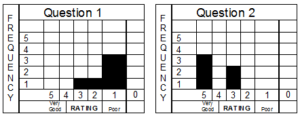Evaluations work. A very effective practice for Board members is to evaluate the quality of their Board operations. Many times, Board members do not know what they do not know about their own Board. Board evaluations are mandatory in many for-profit industries. These Board members know it is critical to regularly conduct short, practical evaluations of their Board operations, and then act on the results of those evaluations during the year.
Evaluations need not take a long time — many times, even 15 minutes a year from each Board member to complete a short questionnaire, followed by half an hour to discuss results and plan a strategy for improvement.
Some boards may feel they do not need assessments. I would suggest that these boards complete this free Board assessment tool offered by BoardWalk Consulting. This assessment should also be completed confidentially. If your board scores anything lower than an eight on any of the five criteria, then it may be time for an evaluation to find and correct deficiencies in your operations.
Before you undertake the exercise to evaluate your board, make sure everyone is onsite with this exercise and the first question to ask is, what are we evaluating? There are different assessments that can be completed, like board effectiveness or individual board members. Individual board member performance should never be evaluated until everyone has been educated on their role within the board. It can be demoralizing to be evaluated against criteria you were not aware was part of your responsibility. We will focus this article on board effectiveness as a whole.
Here are some sample questions to help evaluate your board performance. Have your board members complete the survey, and then summarized the answers. Instruct your board members that the survey should be completed quickly and with honesty, do not over think the answers.
Some points to consider before implementing the assessment.
- Make sure your questionnaire is relevant to your corporation and the items you wish to measure. Your board members will lose interest answering irrelevant questions.
- In order for evaluations to work, everyone must be open and honest. The only way to accomplish this is to ensure confidentiality in the questionnaire. Have an independent third party prepare the summaries.
- Don’t try to be too comprehensive in your assessment.
Commit to acting on the results of your survey. These evaluations tools give an excellent picture of a board weaknesses and strength. Their power is proven. If there is no follow-up to these exercises, then they are simply a waste of the time and energy of your volunteers.
| Criteria | 5 Very Good |
4 | 3 | 2 | 1 | 0 Poor |
|
| 1. | Board has full and common understanding of the roles and responsibilities of members, management and staff within the corporation | ||||||
| 2. | Board receives regular reports on finances/budgets, products/program performance and other important matters | ||||||
| 3. | Board effectively communicates to the community | ||||||
| 4. | Board meetings facilitate focus and progress on important matters | ||||||
| 5. | Board has approved staff policies which are reviewed regularly | ||||||
| 6. | Each member of the board feels involved and interested in the board’s work | ||||||
| 7. | All necessary skills, homeowners wishes and diversity are represented on the board | ||||||
| 8. | The board members receive regular training and information about their responsibilities. | ||||||
| 9. | New board members are oriented to the board, including a board operation manual, the corporations Declaration, By-laws and the Act, as well as their roles and responsibilities as board members. | ||||||
| 10. | Board organization is documented with a description of the board and board committee responsibilities. | ||||||
| 11. | If the corporation has any related party transactions between board members or their family, they are disclosed to the board of directors. | ||||||
| 12. | The organization has at least the minimum number of members on the Board of Directors as required by their bylaws or the Act. | ||||||
| 13. | The board has a process for handling urgent matters between meetings. | ||||||
| 14. | The organization maintains a conflict-of-interest policy and all board members and staff review and/or sign to acknowledge and comply with the policy. | ||||||
| 15. | The board has an annual calendar of meetings. | ||||||
| 16. | Meetings have written agendas and materials relating to significant decisions are given to the board in advance of the meeting. | ||||||
| 17. | Conflicts among directors do not interfere with the Board’s work. | ||||||
| 18. | Our financial monitoring and control systems enable us to quickly identify errors and protect us from most criminal activities. | ||||||
| 19. | Our personnel practices and procedures provide adequate protection from, and recourse for, acts of abuse or harassment. | ||||||
| 20. | We have reason to be optimistic about our ability to deal with whatever the future brings in the next 3 years. | ||||||
| 21. | I am proud to be a Director of this corporation. |
The responses should be collected and summarized. I like to view the summaries in bar graph format.
Sample summary of two question:
 These summaries for each question can then be used to determine if there is a problem in a particular area, and can also help prioritize areas to focus for improvement. The sample summaries show us that the board is receiving its information in a timely manner, but that board members feel they are not feeling informed of their roles.
These summaries for each question can then be used to determine if there is a problem in a particular area, and can also help prioritize areas to focus for improvement. The sample summaries show us that the board is receiving its information in a timely manner, but that board members feel they are not feeling informed of their roles.
Condominium Corporations would do well to take note of the practices of boards in highly effective companies. While the industries may be different, the need for effective decision making structure is the same.

